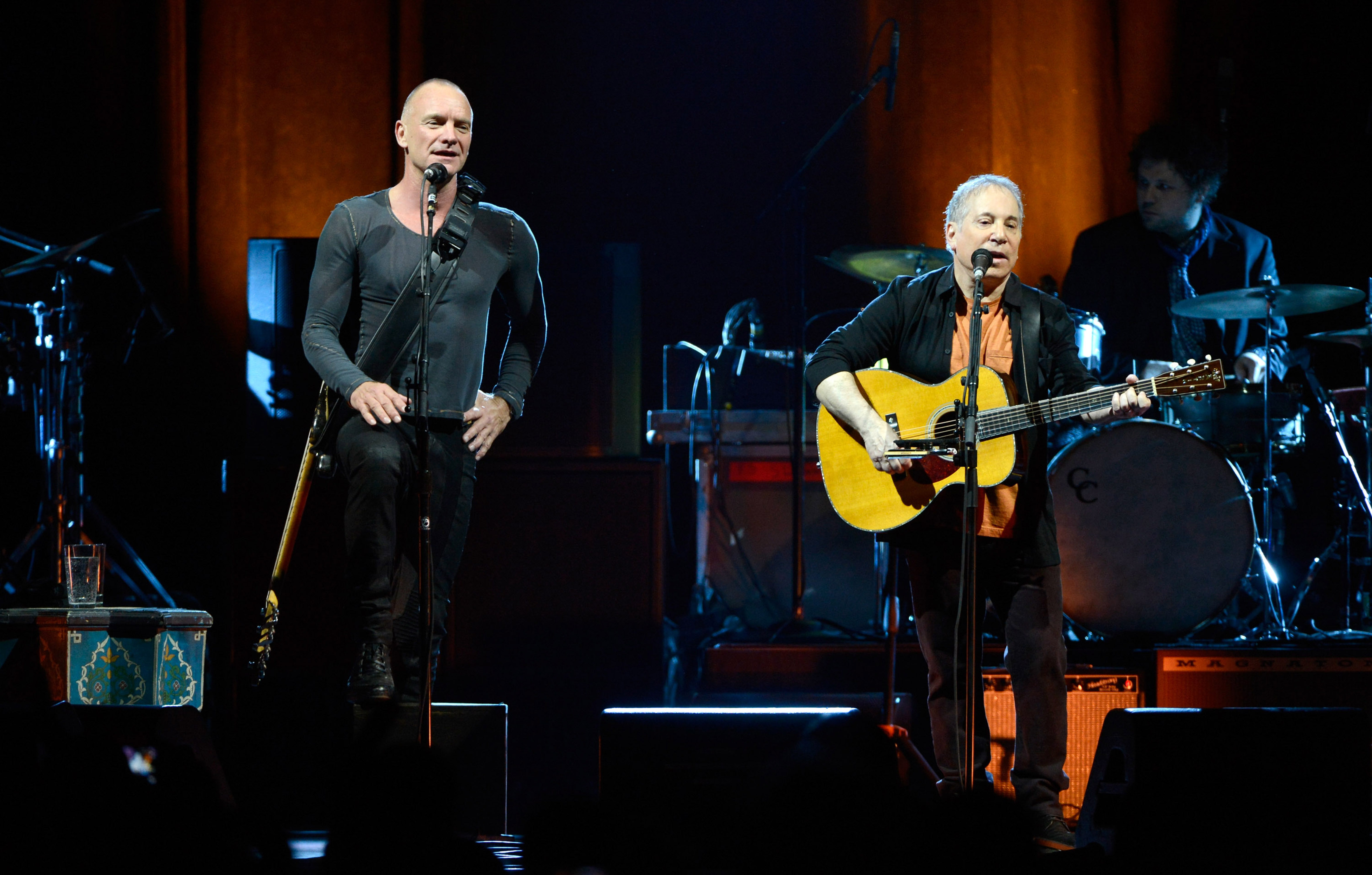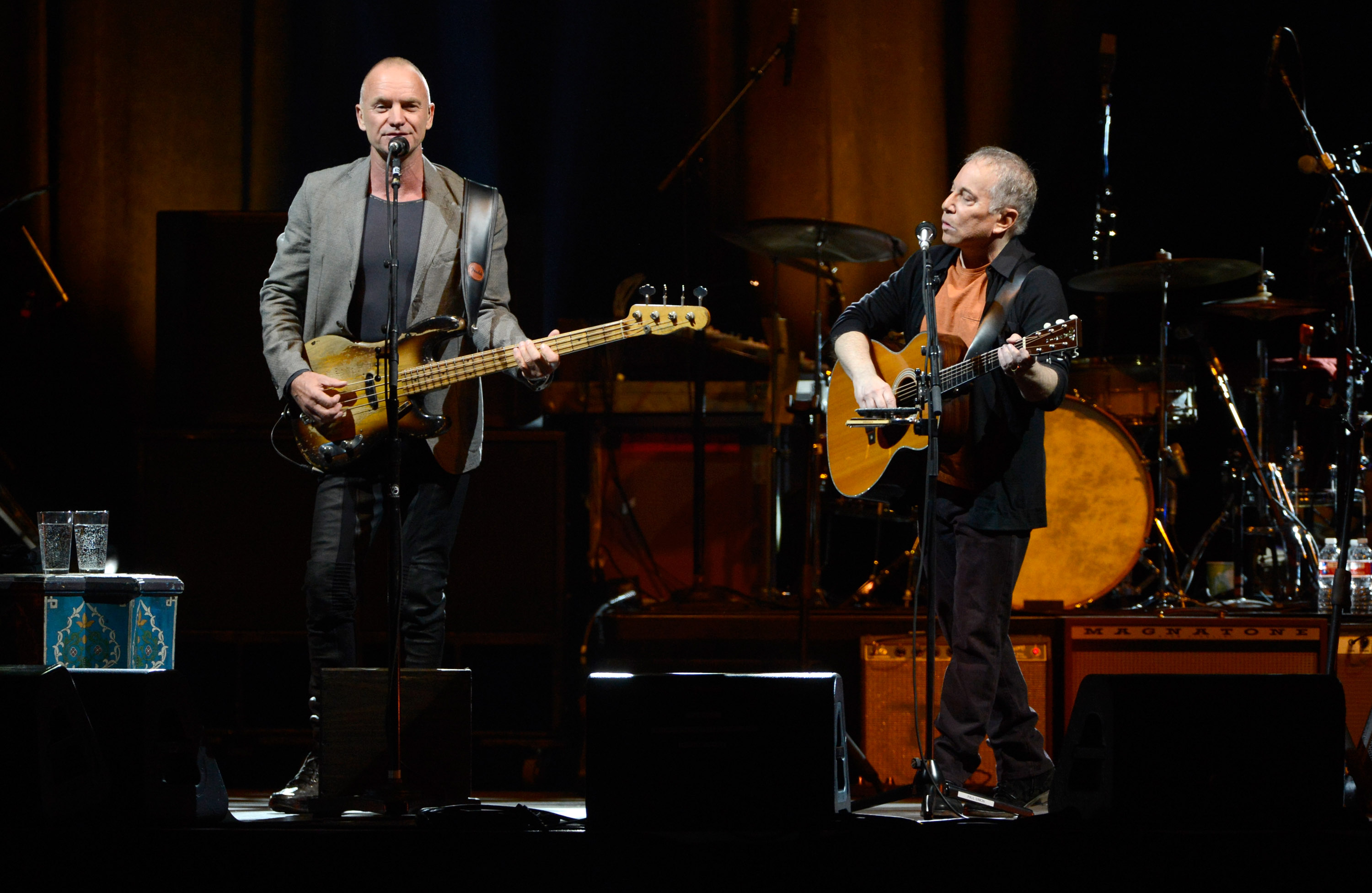
Paul Simon & Sting: On Stage Together – The Forum, Los Angeles, February 15, 2014
Videos by American Songwriter
At first thought it seemed a divergent coupling – Paul Simon and Sting, obviously both tremendous songwriters, each with a formidable and timeless body of work. But together? Would that work? Some people suggested that Sting was a true rock star, whereas Mr. Simon was a folkie, and would be hopelessly outshone. But as time has shown, Paul Simon moves from triumph to triumph, and last night at the Forum was a new chapter of joy in one of America’s most remarkable songwriting stories.
In fact, Simon rocked as hard as Sting. And Sting showed his gentle side too – career-wise, he was embracing softer textures just as Simon began experimenting with global rhythms – and so a ballad like “Fields of Gold” emerged, as melodically poignant as any Simon song. Those in the know know that Simon and Sting had been neighbors for years in the same Central Park West building, and were friends. But what would happen if they merged their shows? The answer is a sum much bigger than its two astounding parts. Not only did they weave their sets together, often trading verses and harmonizing, they melded their bands. So there were two drummers often – and even two bassists (Simon’s longstanding Graceland genius, Bakithi Kumalo – and Sting, who played bass on most of his songs). So we had 18 musicians on stage – drummers, percussion, many guitarists (especially the saintly Vince Nguini, whose rich electric guitar lines and textures add a whole dimension rarely attempted, let alone heard), singers, a horn section, a violinist-mandolinist, keys – and Simon’s Swiss Army Knife of a multi-instrumentalist Mark Stewart, who played slide and regular guitar (wonderful on “Graceland” especially) as well as baritone sax, cello, and penny-whistle.
Watch Videos From Sting And Paul Simon’s Opening Night
Simon seemed especially happy, and was funny from the start. After a spirited opening of Sting’s “Brand New Day” morphing into Simon’s “Boy In The Bubble,” Simon said, “Welcome to our experiment. As time goes on, I am sure we will become even more like each other. Soon I will also have the body of an Adonis, and have sex for weeks at a time.” He also welcomed the audience to the newly-opened and refurbished Forum, former home of the Lakers, by saying, “This is great here. I expect to see Magic Johnson and Jack Nicholson right in front.”
More than anything, what came across was a tremendous mutual respect. Simon has only done this kind of tour – sharing the spotlight – once before, with a guy named Dylan. Who is known for being a rather great songwriter. When Paul and Bob sang together, as they did on “Blue Moon of Kentucky” and other songs, it was Paul – just like Joan Baez used to do – trying to match Dylan’s unpredictable phrasing. It was fun to hear, and funny – but not great music. Whereas Simon and Sting, well, you could tell these guys practiced. They joined their spirits musically with seamless soul, enlivened by the greatness of each other’s material. Sting sang beautiful and perfect harmony on “The Boxer,” one of the most famous two-part harmony songs of all time, and also took on Art Garfunkel’s famous soaring beauty on “Bridge Over Troubled Water,” easily nailing the dramatically stratospheric ending.
Simon added his sweet tenor to “Fields of Gold,” which flowed with great wistful beauty, and also inserted his shine into “Every Breath You Take,” which like a lot of his songs, appears at first to be lyrically simpler than it is, hiding in its tunefulness an ominous mystery.
As Simon once told me, he’s long been considered a folksinger “because of proximity to an acoustic guitar.” And it’s true that few songwriters have ever touched the folky, gentle heart of some of his finest songs, such as “The Boxer.” But if last night showed us anything, it’s that Simon has steadily been accumulating an astonishing collection of upbeat songs, work as invigorating and uplifting as any, starting back with the mysterious ska dimensions of “Mother and Child Reunion” (one of the first reggae-tinged tracks ever to touch American pop radio, long before Sting employed similar rhythms with The Police), “50 Ways To Leave Your Lover” (with its intoxicating martial drum groove, as invented by Steve Gadd), “Late In The Evening” (maybe his best song ever about the sheer power of music itself, emboldened by its great groove and New York-Latin horn exhortations), and “Me and Julio” – which is both sweet and undeniable. Add to that a chain of songs from his landmark Graceland, including the title song, plus “Diamonds On The Soles of Her Shoes” (which got the audience crazy with elation), “Boy In The Bubble” (with its big bass drum slams linked to portentous minor-key accordion and one of Simon’s most modern and timeless lyrics, “…these are the days of miracle and wonder”), the New Orleans temporal gumbo of “That Was Your Mother,” and, of course, “You Can Call Me Al,” which is just pure fun – though always with the Simon genius blending, as he explained, colloquial and enriched language, so that in the same song we get “A man walks down a street” like the opening of an old joke, to the promise of “angels spinning in infinity.”
We also unexpectedly got the opening song of The Rhythm of the Saints, “The Obvious Child,” with its enigmatic linking of baseball and Christianity. “The cross is in the ballpark…” And as a special gift to his fans who adored one of his lesser known masterpieces, Hearts and Bones, he played a brilliantly sweet rendition of that title song, with its bi-coastal, duo-religious opening: “One and one-half wandering Jews/free to wander wherever they choose…” And he also gave us “Still Crazy After All These Years,” with its breathtaking chromatic bridge and famous soaring sax solo. Even among this profusion of riches, Simon gave us more, a charged version of a song he often refers to as his favorite, “Mystery Train,” by Junior Parker. These are the roots of this man’s rhythm, before folk and Dylan infiltrated his world.
Sting spoke of being humbled by the sheer magnitude of Simon’s work, which was a touching tribute coming from this fellow giant. He then launched into his own successive masterpieces, new and old. “Fragile,” with its worldly melodics and tender humanity, was an ideal duet with Simon, who embraced its spirit like one of his own. And though Sting eluded several of his biggest solo hits, such as “If You Love Somebody,” he did dip into his Police days with “Message In A Bottle” and “Roxanne,” and also gave us a gorgeous turn on “Driven To Tears.” He said that, like a lot of Brits, he often yearned to write American country songs, and felt validated in this pursuit when Johnny Cash recorded his song “Hang Your Head.” It was a revelation, visceral in an odd time signature that was hypnotic. But perhaps Sting’s most exhilarating performance was his “Desert Rose,” with its Turkish, Middle-eastern melodics – a kind of world music even Paul Simon hasn’t utilized — and his band on fire, whirling in the ecstatic dervish of this extraordinary song.
Sting spoke about the baby days of The Police, when they drove through all of America in a little car, staying in cheap motels, playing to mostly empty clubs. The mystery, sorrow and joy of those days, he said, were best expressed by Simon in his classic “America,” which Sting then sang himself, to a breezy tempo on an acoustic guitar.
Like the recent Beatles show and special, the big question here was just how will they end the show. It was the song many consider Simon’s greatest, “Bridge Over Troubled Water,” with Sting valiantly taking over the Garfunkel portion as if he’s sung it his whole life. Standing ovation. And then, after the last band number, with the huge ensemble joining at stage front and then dissembling, Simon and Sting remained, and did one last song – just the two of them – acoustic. It was a tribute to a man who Simon said was both a great friend, and an idol, Phil Everly: “How Will I Be Loved,” with Simon and Sting joining their voices in perfect and poignant harmony. It was a simple and stunning closer to an extraordinary night. The new Forum was mostly great – beautifully fresh and refurbished inside, with excellent sound (especially by the third song, when the lead vocals got dialed in right).
The only drawback to the place – and it’s a big one – is that for some reason, unlike the similarly immense Staples with its many exit doors on many sides – this had very few exits, so that the gargantuan crowd had to squeeze very slowly through long winding corridors, not unlike sheep to the slaughter, at a snail’s pace, before finally ascending stairs to eventual freedom. As many crowded in this crowd soberly noted, were there (God forbid) a fire, earthquake or other occurrence that would require fast evacuation, it would be impossible, and result in a disaster of vast proportions. How fire marshalls ever approved this plan is staggering. This would be problematic anywhere, but especially here in earthquake country where such an exit could become urgently necessary at any moment; it’ egregious and hard to fathom. Forum folks – before there is a terrible accident – open more doors please! But it wasn’t enough to diminish the impact of this momentous show, this great melding of music by two of the world’s finest songwriters and singers. Paul and Sting seemed to have as much fun as we did. And that was infectious. We got three solid hours of amazing material, performed by two true pros with a small army of world-class musicians. It was a joyful night, and a great reminder that even in our technology-obsessed world, nothing can touch the greatness of real musicians joining together on great songs. Rejoice.















Leave a Reply
Only members can comment. Become a member. Already a member? Log in.